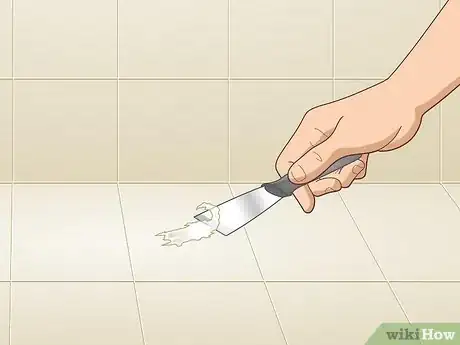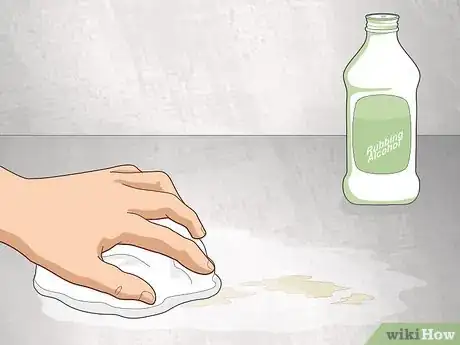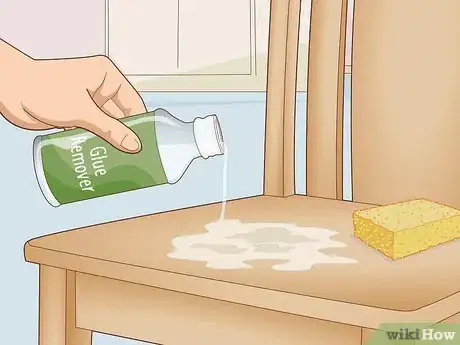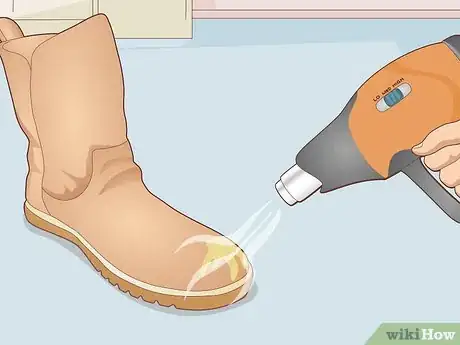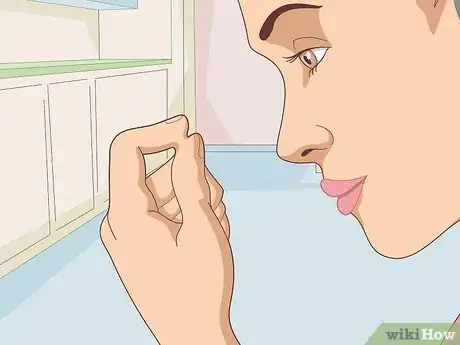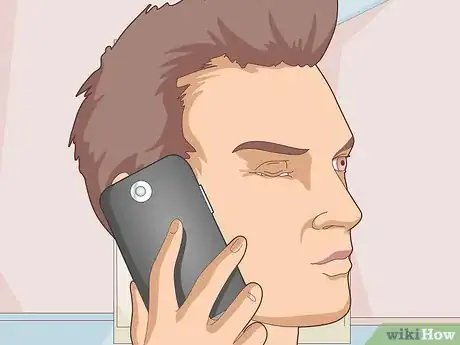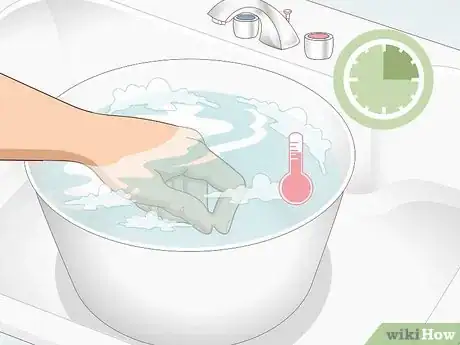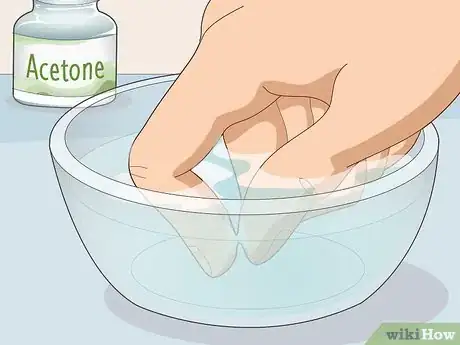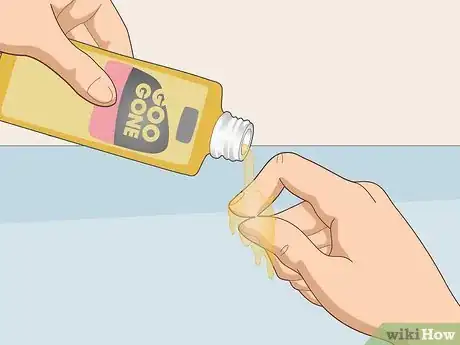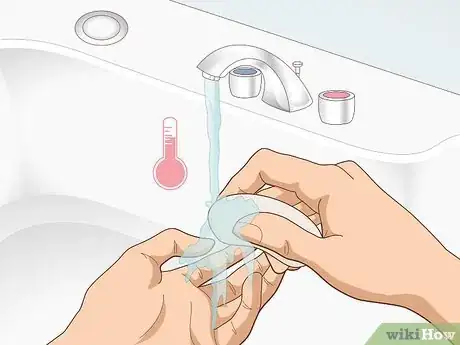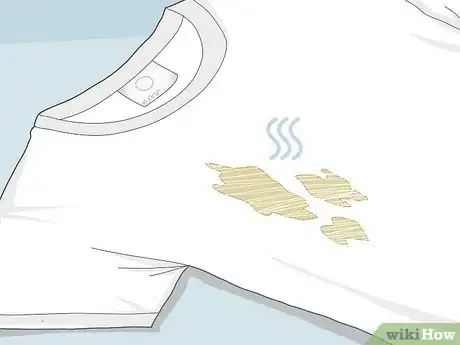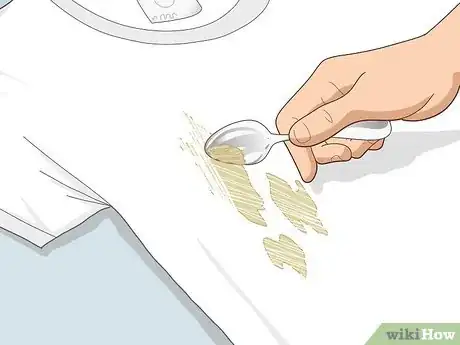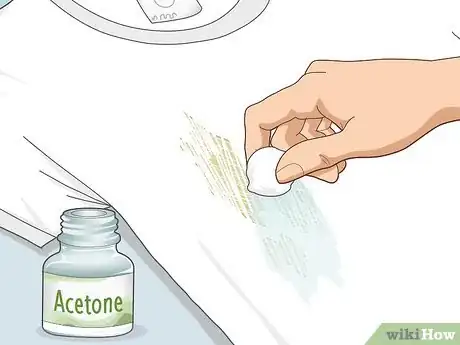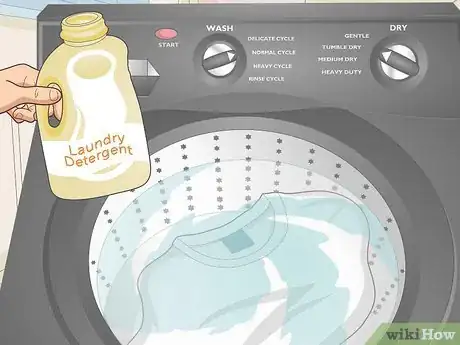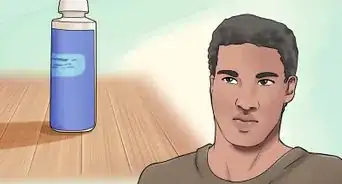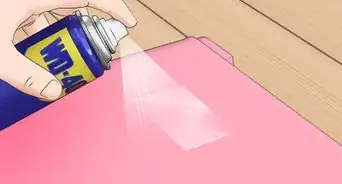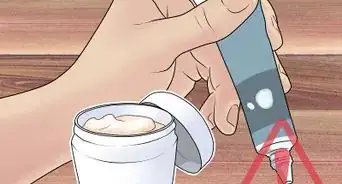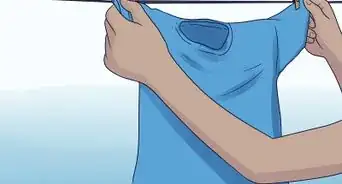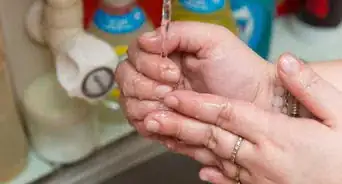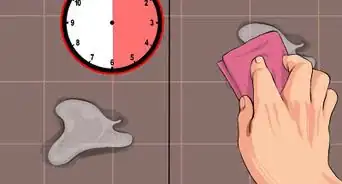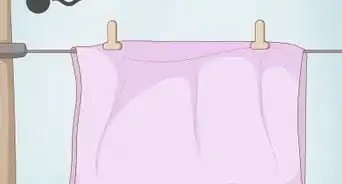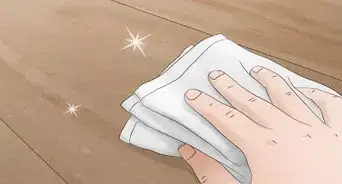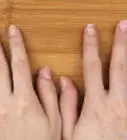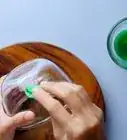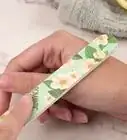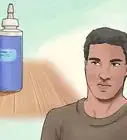This article was co-authored by Ryaan Tuttle. Ryaan Tuttle is a Home Improvement Specialist and the CEO of Best Handyman, Inc. in Boston, Massachusetts. With over 17 years of experience, he specializes in building home service businesses, focusing on creating scalable and efficient brands. With the help of his global team, the companies have achieved over 10+ million in sales and received recognition through magazine features, and enjoy partnerships with wikiHow and Jobber field service software. Boston Magazine and LocalBest.com have named Best Handyman Boston the Best Handyman in Boston. Ryaan holds Construction Supervisor and Home Improvement Contractor Licenses.
This article has been viewed 13,201 times.
Industrial-strength glues are tricky to remove if you accidentally get some adhesive on a surface or piece of skin that you didn’t intend to. You might try a combination of techniques to get glue off of various hard surfaces, being careful to test potentially harmful products on the surface before proceeding to clean the glue off. Products like acetone can also be used to remove industrial glue from fabric and skin. As long as you use the right techniques and have a lot of patience, you can remove industrial glue and get out of even the stickiest of situations.
Steps
Cleaning Hard Surfaces
-
1Scrape dried glue off of any hard surface using a putty knife. Carefully use the edge of a metal putty knife to scrape dried industrial glue off of hard surfaces like wood or laminate flooring, tiles, glass, tabletops, and countertops. Position the edge of the putty knife so that it is almost parallel to the surface and scrape away from you, being careful not to gouge or scratch the surface.[1]
- This method will work to remove small amounts of dried industrial adhesive at a time. Be patient and keep working away at the dried glue until you have removed as much as you can, then you may need to use another method to get rid of any remaining residue.
-
2Use acetone or rubbing alcohol to remove glue from unpainted surfaces. Dampen a rag with acetone or rubbing alcohol. Scrub away at the stuck-on residue until it dissolves and comes off.[2]
- If scrubbing with the solvent doesn’t seem to work right away, press the rag soaked with solvent against the residue and leave it sitting for 5-10 minutes, then try scrubbing it again.
- If the glue is on a small portable object, like a piece of pipe or something like that, you can also soak it in a tub of solvent for up to a full day to dissolve the glue.
- You can try other solvents like paint thinner, isopropyl alcohol, or mineral spirits as well.
- Acetone might ruin the surface or change its color and, depending on the situation, it might still not be strong enough to remove industrial glue.
Warning: Solvents like rubbing alcohol and acetone can remove paint and other finishes from surfaces. If you aren’t sure what effect the solvent will have on the surface, test it on an inconspicuous area first to make sure it is safe.
Advertisement -
3Apply an industrial-grade glue remover to non-delicate hard surfaces. Test the adhesive remover on a hidden area of the surface first to make sure it won’t damage the surface. Apply the amount of adhesive recommended by the manufacturer to the adhesive residue, let it sit for the specified amount of time, then use the provided sponge or scraper to scrub away at the adhesive until it comes off.[3]
- Always read the manufacturer’s instructions for these types of industrial adhesive removers before using them and follow any specific recommendations. These substances contain powerful chemicals that can be harmful to your skin or if inhaled or ingested.
- If the residue still doesn’t come off after your first attempt with the industrial glue remover, apply the remover again and let it sit for 1 hour. Try scrubbing it with a sponge or scraping it with a putty knife after the hour has passed.
- Be extra careful when removing residue from plastic, and make sure the remover won't damage the finish of the color of the surface.
-
4Heat adhesive stuck to delicate surfaces with a heat gun or hair dryer. Turn the heat gun or hair dryer on to the hottest setting and aim the nozzle at the glue, keeping it about 4–6 in (10–15 cm) away from the surface. Try gently scraping the glue off after it is warm using the edge of a putty knife or a scrubber sponge.[4]
- This method can work to melt and soften some types of industrial adhesives when you are worried that scraping the surface too much or applying a solvent or glue remover to it will cause damage.
- If you don’t have a heat gun or hair dryer, you could also try pouring boiling water on the surface. Just be sure the surface can handle the heat and moisture before you try this.
Removing Industrial Adhesive from Skin
-
1Remain calm. Don’t try to force your fingers apart if you have glued them together or if they are stuck to something else. Stay calm and avoid touching anything with the affected skin in case the glue is still sticky.[5]
- If you accidentally glue your fingers together and try to rip them apart, you might end up pulling the skin off and causing yourself more pain and a bigger issue. Staying calm will allow you to address the situation appropriately and remove the glue.
-
2Seek immediate medical attention if the glue is on a sensitive area. Call an ambulance or go to the hospital if you have gotten industrial adhesive on your lips, eyelids, or another sensitive area. Medical professionals will be able to handle the situation most effectively to avoid complications.[6]
- In the unlikely event that you accidentally glued an eyelid or your mouth shut, do not under any circumstances try to pry or rip them open. This will just cause a bigger injury, so get medical help right away.
-
3Soak non-sensitive areas of affected skin in warm soapy water for 15 minutes. Fill a container that is large enough to submerge the affected area with warm water and 2-3 squirts of liquid dish detergent. Submerge the skin with the glue on it in the container and let it soak for 15 minutes, gently rubbing your skin with your fingertips and nails every 2-3 minutes to check if the glue is loosening.[7]
- For example, if you got glue on your fingers, a small bowl is large enough to soak the area in. If you got adhesive on an area that is trickier to submerge, let’s say your forearm, then you will need something much larger like a bucket.
Tip: If your fingertips are stuck together, move them in a back and forth motion, as if you were rolling something between your fingers, until you feel the adhesive loosen and you can separate them.
-
4Try soaking the area in acetone if warm soapy water doesn’t work. Fill a small container with acetone and submerge the affected area or soak a cloth with acetone and hold it against the residue on the skin. Soak the glue for 5-10 minutes until it starts to break down, then scrub it gently with your fingernails or the cloth to remove it.[8]
- Acetone can dry out your skin, so it’s a good idea to apply some body moisturizer or hand lotion to the affected area after you have removed the glue.
- If the residue is coming off, but you can’t remove it all after the first attempt, repeat this process as many times as necessary until it is all gone.
-
5Use a petroleum-based solvent if the glue still won’t loosen. Apply a petroleum-based solvent, such as Goo Gone, to the stuck-on adhesive. Let it sit for the amount of time specified by the manufacturer or about 15 minutes, then scrape the glue off.[9]
- Do not use these types of solvents on sensitive areas or near your eyes and mouth. They contain chemicals that can be very harmful if ingested or cause high levels of irritation on sensitive skin.
-
6Wash the skin with warm water and soap after all the glue is gone. Rinse the area with warm water, then lather it up with hand or body soap to get rid of any traces of solvents you used on the skin. Rinse the soap off thoroughly, then pat the skin dry with a clean dry towel.[10]
Getting Industrial Glue off of Fabric
-
1Let the glue dry completely before attempting to remove it. Wet adhesive may spread if you attempt to clean it right away. Wait until the industrial adhesive is totally dry to the touch before you try to remove it from fabric.[11]
- You can use the techniques in this method to remove industrial glue from any type of fabric, such as clothing or upholstery.
Tip: You can check if the adhesive is cured by poking it with the tip of a spoon. If it feels hard and crusty and doesn’t stick to the spoon, you can go ahead and start trying to remove it.
-
2Scrape off as much of the adhesive as possible with the edge of a spoon. Use the edge of a metal spoon to carefully scrape away at the adhesive. Stop and move on to another technique if none of the adhesive is coming off so you don’t damage the fabric by scraping too aggressively.[12]
- If the glue is on a particularly delicate type of fabric, like lace or silk, skip this step so you don’t accidentally stretch or tear it.
-
3Wipe the glue gently with acetone if it won’t damage the fabric. Soak a cotton ball or cotton swab with acetone and test it on a hidden area of the fabric to make sure it doesn’t cause any discoloration. Rub the acetone onto the area with the stuck-on adhesive until you have removed as much as will come off.[13]
- Glue generally comes off in layers, so be patient and keep applying more acetone to try and remove as much of the adhesive as you can. Keep in mind that you might not be able to get 100% of it off.
- If the fabric is fairly durable, such as thick upholstery on a couch or another piece of furniture, you can also try using an old toothbrush to scrub the affected area with acetone.
-
4Wash the fabric in a laundry machine with laundry detergent if possible. Put pieces of clothing or other portable fabric items that have industrial glue on them into a laundry machine and wash them with laundry detergent as you normally would, avoiding hot water. Check if the glue stain is removed after the first wash and repeat the wash if there is any residue left.[14]
- It’s best not to dry the fabric until the glue is completely removed to avoid setting it into the fabric further. If you can’t get it all off, hang the fabric to air dry rather than drying it in a machine using heat. This way, the glue may continue to come out with repeated washing.
- You can try pre-treating glue stains by rubbing laundry detergent or a specific pre-treatment product into them if regular washing doesn’t do the trick.
Warnings
- Always read the manufacturer’s instructions very carefully before using any industrial-grade glue removers and defer to their directions for use.[17]⧼thumbs_response⧽
- Test acetone or rubbing alcohol on an inconspicuous area first to ensure that it will not damage the material.[18]⧼thumbs_response⧽
- If you glue your fingers or any other 2 pieces of skin together, don’t try to rip them apart.[19]⧼thumbs_response⧽
- Get immediate medical help if you get industrial glue on your eyelids, lips, or any other sensitive area.[20]⧼thumbs_response⧽
Things You’ll Need
Cleaning Hard Surfaces
- Putty knife
- Rubbing alcohol or acetone
- Industrial-grade adhesive remover
- Heat gun or hair dryer
Removing Industrial Adhesive from Skin
- Warm water
- Liquid dish detergent
- Container
- Acetone
- Cloth
- Petroleum-based solvent
- Hand or body soap
- Clean towel
Getting Industrial Glue off of Fabric
- Spoon
- Acetone
- Cotton ball or cotton swab
- Laundry detergent
- Laundry machine
Expert Interview

Thanks for reading our article! If you'd like to learn more about working on your home, check out our in-depth interview with Ryaan Tuttle.
References
- ↑ https://www.gluegun.com/blogs/news/industrial-glue-removal-101-tips-tricks-more
- ↑ https://www.galindberg.se/blogg/how-to-remove-industrial-adhesive/
- ↑ https://www.gluegun.com/blogs/news/industrial-glue-removal-101-tips-tricks-more
- ↑ https://www.cleanipedia.com/in/en/floor-and-surface-cleaning/how-to-remove-super-glue.html
- ↑ https://www.galindberg.se/blogg/how-to-remove-industrial-adhesive/
- ↑ https://www.gluegun.com/blogs/news/industrial-glue-removal-101-tips-tricks-more
- ↑ https://www.gluegun.com/blogs/news/industrial-glue-removal-101-tips-tricks-more
- ↑ https://www.gluegun.com/blogs/news/industrial-glue-removal-101-tips-tricks-more
- ↑ https://www.gluegun.com/blogs/news/industrial-glue-removal-101-tips-tricks-more
- ↑ https://www.gluegun.com/blogs/news/industrial-glue-removal-101-tips-tricks-more
- ↑ https://www.cleanipedia.com/gb/laundry/how-to-remove-glue-from-clothes.html
- ↑ https://www.cleanipedia.com/gb/laundry/how-to-remove-glue-from-clothes.html
- ↑ https://supergluecorp.com/faq/
- ↑ https://www.cleanipedia.com/gb/laundry/how-to-remove-glue-from-clothes.html
- ↑ https://www.cleanipedia.com/in/en/floor-and-surface-cleaning/how-to-remove-super-glue.html
- ↑ https://www.gluegun.com/blogs/news/industrial-glue-removal-101-tips-tricks-more
- ↑ https://www.gluegun.com/blogs/news/industrial-glue-removal-101-tips-tricks-more
- ↑ https://www.gluegun.com/blogs/news/industrial-glue-removal-101-tips-tricks-more
- ↑ https://www.galindberg.se/blogg/how-to-remove-industrial-adhesive/
- ↑ https://www.galindberg.se/blogg/how-to-remove-industrial-adhesive/
